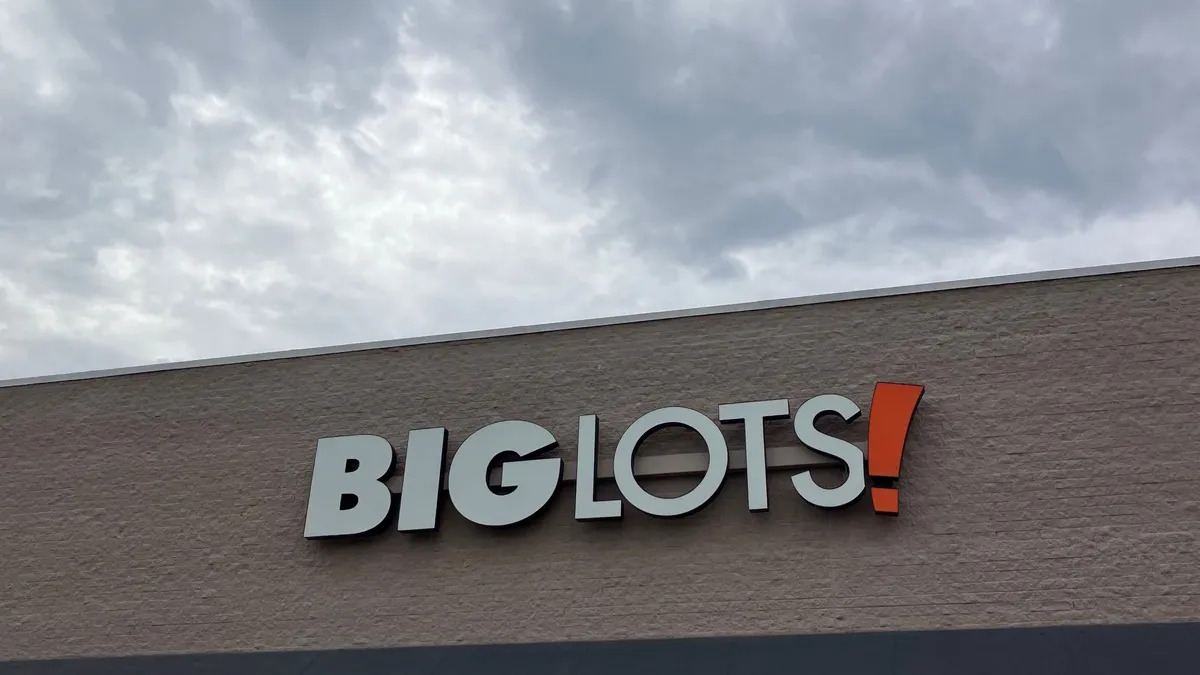Dive Brief:
- Big Lots will start going out of business sales at all of its stores after a failed deal to sell itself to private equity firm Nexus Capital Management, the retailer said Thursday.
- Additionally, according to a Worker Adjustment and Retraining Notice, 555 employees at the company’s corporate headquarters in Columbus, Ohio, will be permanently laid off starting Dec. 29.
- The company sought Chapter 11 protection in September. Big Lots said it’s pursuing a going concern sale with Nexus or another entity and wants to complete a sale by early January.
Dive Insight:
Big Lots said in its statement that initiating the going out of business sales across its store fleet will protect the value of the company’s assets and won’t prevent or diminish its pursuit of a going concern sale.
“We all have worked extremely hard and have taken every step to complete a going concern sale,” Bruce Thorn, Big Lots’ president and chief executive officer, said in a statement. “While we remain hopeful that we can close an alternative going concern transaction, in order to protect the value of the Big Lots estate, we have made the difficult decision to begin the [going out of business] process.”
On Friday, the home page of the company’s website indicated that all stores were closing with offers of up to 50% off items across the entire store. Two people on LinkedIn who identified themselves as laid off Big Lots employees described the company’s actions as a liquidation.
“I felt a lot of emotion if I’m going to be honest,” a third person, who identified themselves as a Big Lots store manager, said on their LinkedIn profile. “Hurt, fear, anger, sadness. I’m sure we can all relate.”
The decision follows several moves the company made over the last 18 months to cut costs and stabilize the business. They include sale-leasebacks of stores; a $200 million term loan backed by a mortgage on the company’s corporate headquarters and liens on most of the retailer’s working capital and personal property; and closing over 300 underperforming stores.
On the same day it filed Chapter 11, Big Lots said it had secured $707.5 million in post-bankruptcy commitments, including $35 million in new financing, from its lenders. In November, the retailer said it had received court approval to sell most of its assets to Nexus for $2.5 million in cash, debt payoffs to select entities and the assumption of some liabilities. Nexus was the stalking horse bidder.
“Nexus Capital was expected to purchase Big Lots out of bankruptcy but said they would not proceed with the transaction because Big Lots was not able to maintain minimum assets levels and sufficient liquidity to close the transaction by December 31,” Tim Hynes, Debtwire’s global head of credit research, told Retail Dive in an email.
The company’s issues began over a decade ago, when it refocused its strategy away from closeouts and extreme bargains between 2013 and 2018, Big Lots said in bankruptcy court documents. That move resulted in higher average product prices, lower customer traffic and stalled sales volume.
To jump start a turnaround, the company began re-emphasizing its bargain value proposition in 2019. But shortly after, Big Lots needed to refocus to address challenges brought by the emergence of the COVID-19 pandemic. More recently, the retailer said consumers’ cutbacks on discretionary spending hurt the company. Its primary product offerings are furniture, home decor and seasonal products.
Founded in 1967, Big Lots grew through acquisitions of other retail chains. At the time of its bankruptcy filing, Big Lots had about $556 million in debt, about 1,300 stores in 48 states and 27,700 employees. It operated about 870 stores as of Thursday, Bloomberg reported.















